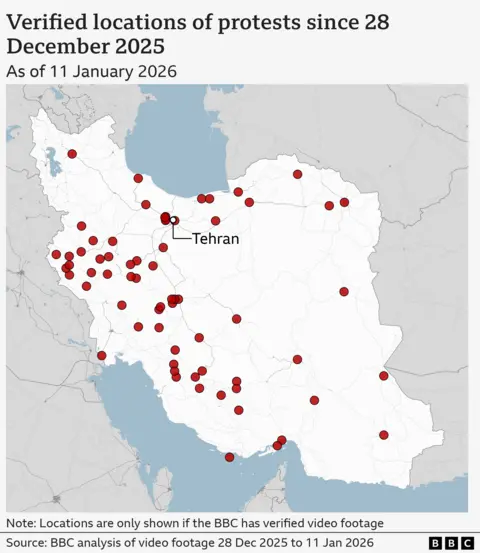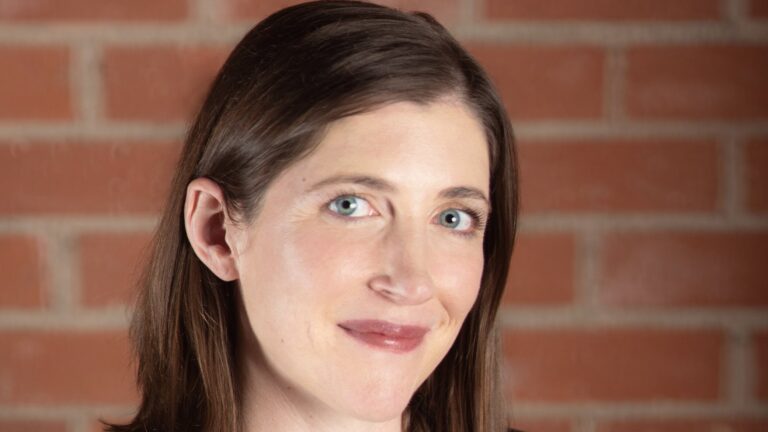 Reuters
ReutersMore than 2,000 people have been killed during the violent crackdown by security forces on protests in Iran, a human rights group has said, as President Trump promised Iranians that help was “on its way”.
The US-based Human Rights Activists News Agency (HRANA) reported that it had so far confirmed the killing of 1,850 protesters, 135 people affiliated with the government and nine uninvolved civilians as well as nine children over the last 17 days despite an internet blackout.
An Iranian official also told Reuters that 2,000 people had been killed but that “terrorists” were to blame.
Trump said Iranian authorities would “pay a big price” for the killings and urged people to “keep protesting”.
He has been weighing military and other options in response to the crackdown, having already announced 25% tariffs on any country trading with Iran.
The protests, which have reportedly spread to 180 cities and towns in all 31 provinces, were sparked by anger over the collapse of the Iranian currency and soaring cost of living.
They quickly widened into demands for political change and became one of the most serious challenges to the clerical establishment since the 1979 Islamic revolution.
The protests escalated significantly last Thursday and were met with deadly force by authorities, masked by a near total shutdown of the internet and communication services.
HRANA said on Tuesday afternoon that, as well as confirming the killing of at least 2,003 people during the unrest, it was also reviewing reports of another 779 deaths.
“We’re horrified, but we still think the number is conservative,” Deputy Director Skylar Thompson told the Associated Press.
Another group, Norway-based Iran Human Rights (IHR), meanwhile said it had confirmed the killing of at least 734 protesters.
Its director, Mahmood Amiry-Moghaddam, told AFP news agency that the figures were “based on information received from fewer than half of the country’s provinces and fewer than 10% of Iran’s hospitals”, adding: “The real number of those killed is likely in the thousands.”
Reuters said the unnamed Iranian official who put the death toll at about 2,000 had not given a breakdown of the figure. However, it added, he said “terrorists” were behind the deaths of both protesters and security personnel.
It is difficult to gauge the true scale of bloodshed because, like other international news organisations, the BBC is not able to report from inside the country.
However, videos posted online on Sunday showed people searching for the bodies of their loved ones at the Kahrizak Forensic Centre in Tehran. The BBC counted at least 180 shrouded bodies and body bags in the footage.
Around 50 bodies were visible in another video from the facility shared on Monday.
“My friend went there [Kahrizak] to look for his brother, and he forgot his own sorrow,” an activist told BBC Persian on Monday.
“They piled up bodies from every neighbourhood, like Saadatabad, Naziabad, Sattarkhan. So you go to your address pile and search there. You don’t know a fraction of the level of violence that’s been used.”
Hospitals in the capital have also reportedly been overwhelmed by the number of casualties.
Prof Shahram Kordasti, an Iranian oncologist based in London, told the BBC’s Newsday programme on Tuesday that the last message he had received from a colleague in Tehran said: “In most hospitals, it’s like a warzone. We are short of supplies, short of blood.”
Other doctors at “two to three hospitals” had also said they had treated hundreds of injured or dead people, he added.
An Iranian living in Rasht, near the Caspian Sea coast, described the city as unrecognisable. “Everywhere is burnt with fire,” they said.

Not long after HRANA released its latest death toll, President Trump wrote on Truth Social: “Iranian Patriots, KEEP PROTESTING – TAKE OVER YOUR INSTITUTIONS!!! Save the names of the killers and abusers. They will pay a big price.”
“I have cancelled all meetings with Iranian Officials until the senseless killing of protesters STOPS. HELP IS ON ITS WAY. MIGA!!!,” he added, using the acronym for a US-based Iranian opposition slogan, “Make Iran Great Again”.
Trump’s national security team was expected to hold a meeting at the White House on Tuesday to discuss options for Iran.
On Monday night, US defence officials told the BBC’s US partner, CBS news, that Trump had been briefed on a wide range of covert and military tools, including long-range missile strikes, cyber operations and psychological campaign responses.
At the same time, Iranian Foreign Minister Abbas Araghchi told Al Jazeera that Iran was ready for diplomacy but also for other options, including “if the US wanted to test the military option which it had tested in the past”. In June, the US carried out air strikes on key Iranian nuclear facilities during a 12-day war between Iran and Israel.
Araghchi also said that Iranian government had been in dialogue with protesters, but that it had been forced to take action after “trained terrorist groups” run from abroad infiltrated the demonstrations and targeted security forces.
His comments echoed those of the Supreme Leader, Ayatollah Ali Khamenei, who told supporters at state-organised rallies across the country on Monday that they had “neutralised the plans by foreign enemies that were meant to be performed by domestic mercenaries”.
 EPA
EPAAlso on Tuesday, UK Foreign Secretary Yvette Cooper summoned the Iranian ambassador to protest in response at what she called “the horrendous and brutal killing of Iranian protesters”.
The UN human rights chief Volker Türk urged Iranian authorities to halt all forms of violence and repression against peaceful protesters immediately, his office said.
He added that the labelling of protesters as “terrorists” to justify violence was unacceptable and that it was “extremely worrying” to see statements from Iranian officials indicating the possibility of the death penalty being used against protesters through expedited trials.
Judiciary chief Gholamhossein Mohseni Ejei said on Monday that those involved in the unrest would be “dealt with seriously and severely”. And prosecutors have said some will be charged with “enmity against God”, a national security offence that carries the death penalty.
More than 16,780 protesters have been arrested during the unrest, according to HRANA.
A 26-year-old man detained last Thursday has already been sentenced to death, according to his family and Norway-based Kurdish human rights group Hengaw.
A relative of Erfan Soltani’s family told BBC Persian that “in an extremely rapid process, within just two days, the court issued a death sentence, and the family was told that he is due to be executed [this] Wednesday”.
“We have never witnessed a case move so quickly,” Awyar Shekhi of Hengaw told the BBC. “The government is using every tactic they know to suppress people and spread fear.”
Speaking to the BBC’s US news partner CBS later on Tuesday, Trump said the US would take “very strong action” if Iran’s authorities started hanging protesters.
“If they hang them, you’re going to see some things… We will take very strong action if they do such a thing,” he said.
 BBC Persian
BBC PersianTürk also demanded that Iranian authorities restore full access to the internet and other communication services.
Some international calls from Iran went through on Tuesday, but the internet shutdown has now passed 120 hours, according to monitor NetBlocks.
One person living near Tehran with access via the Starlink satellite service told BBC Persian that there were “checkpoints in every block”, where cars and the phones of their occupants were being inspected by security forces.
New videos of protests in recent days have also emerged, with BBC Persian verifying those filmed in the central city of Arak and the western cities of Tabriz, Urmia and Khorramabad.
In the footage from Khorramabad, gunfire can be heard during clashes between security forces and protesters, some of whom are throwing stones.
The protesters chant slogans “Death to the dictator” – a reference to Ayatollah Khamenei – and “Reza Shah, may your soul rest in peace” – referring to the late monarch Mohammad Reza Pahlavi, who was overthrown in the 1979 revolution and whose son Reza lives in exile.













